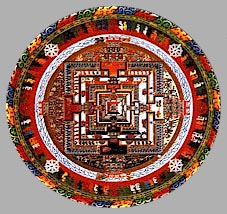Mantras are sometimes misunderstood by Westerners. Many tend to regard it as mere repetitive chatter without investigating the meaning behind the recitation. More than a prayer or idle wish that something good might happen, a mantra recited during meditation is an active thing. It is the individual being mindful about the plight of others, and seeking to take action to free them.
For those reading who are non-Buddhists, this involves meditating upon various aspects of the Buddha with the intent of relieving suffering for all beings, to improve our karma, and to gain new insights which lead to the enlightenment of all.
This is not worshipping the Buddha. This is another area where many Westerners are confused about Buddhism. Unlike Christ, the Buddha is not regarded as a God. The Buddha himself said we are all capable of doing what he did. When someone meditates on the Buddha Akshobhya (one manifestation of the Buddha), he is a symbol used for focusing the mind. He is real, but he is not a "thing" separate from oneself. Indeed, for Buddhists, nothing is separate room us. Westerners read about Buddhist nothingness, and assume it means nihilism. It does not. It means no-"thing"-ness. Nothing is apart from you. All is one. What happens to my brother or sister happens to me.
You are in this case, concentrating on purifying the world and yourself of anger. It is said that by meditating upon the Buddha Akshobhya, "Where there is violence, war is stopped and everyone generates loving kindness, patience, and the whole path to enlightenment." The goal is to make this sentiment become actualized in the minds of all beings. You can think about the words of this mantra and visualize God, Christ, or Allah, or Krishna, or even just the beauty of the universe, and work towards the same goal.
Buddhists believe that this practice purifies negativities accumulated from past lives or the current life, and prevents the ripening of negative actions. It purifies the five extreme negatives (killing your mother, killing your father, killing an "arhat" otherwise known as a saint, causing a
Buddha to shed blood, and causing disharmony among the spiritual community). It is said to have the power to reverse untimely death, and prevents all who hear it (both animals and humans) from falling into the three lower realms. It is said that if it is recited 100,000 times it can rescue someone from the hell realm if you dedicate it to them. It has the power to purify negative karma and if, while dying, or at the instant of death, even seeing the mantra in written form will liberate you from that heavy negative karma.

This is the mantra to recite:
Namo ratna trayaya
Om kamkani kamkani
Rotsani rotsani trotani trotani
Trasani transani tratihana tratihana
Sarwa karma param parani me
Sarwa sato nensta soha
The meaning:
For as long as space endures
And for as long as living beings remain
Until then, may I too abide
To dispel the misery of the world.
It is important to dedicate this mantra to someone, or the release from karma is wasted. So even if you are not a believer in Buddhism, if you simply wish to think about these words, please also dedicate them -- perhaps to our soldiers in the field, and everyone in the Middle East, or to the poor who suffer throughout the world. Your intention is at least as important, if not MORE important, than any belief in some particular dogma or spiritual discipline.
If, by thinking about this, you simply intend to relieve the sufferings of others, you cannot help but improve some small measure of the world, and that is a precious gift.